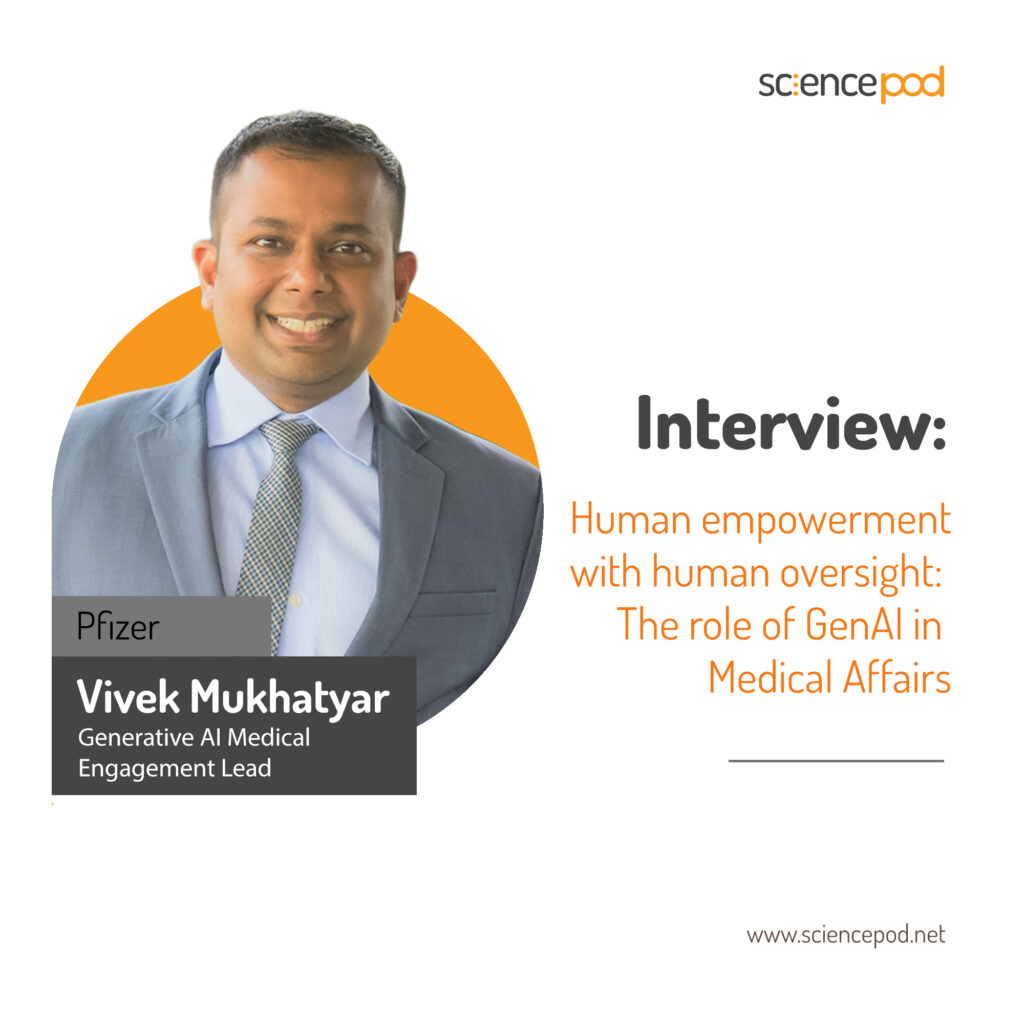Interview with Vivek Mukhatyar, Generative AI Medical Engagement Lead, Pfizer
The advent of GenAI has sparked both blind panic and unbalanced adulation. While both these reactions likely miss the mark, have you considered that our relationship with GenAI is one of both ongoing responsibility to oversee its activities and increasing empowerment as it begins to fundamentally change how many of us work?
This nuanced view is posited by Vivek Mukhatyar, Generative AI Medical Engagement Lead at Pfizer. SciencePOD had the opportunity to speak with Vivek, ahead of the NEXT Pharma Summit 2025, which runs from 20-21 May, Dubrovnik, Croatia. Vivek will be speaking in the session: Pharma’s New Buzzword? Why Optichannel Might Be the Game-Changer for Customer Engagement
Please describe your current role and its main focus.
I currently serve as the GenAI Medical Engagement Lead at Pfizer, where I focus on identifying, piloting, and scaling generative AI solutions across Medical Affairs. My role involves working cross-functionally with teams such as Scientific Communications, Field Medical, Omnichannel Strategy, and Medical Content to integrate GenAI into everyday workflows, whether that’s accelerating content creation, improving insight generation, or enhancing HCP engagement.
A big part of what I do is helping teams move from experimentation to operationalisation. I also love upskilling our internal colleagues by organising a variety of GenAI educational activities, such as hands-on hackathons, live demos, and practical training sessions, especially to help them build confidence and explore how GenAI can support their day-to-day work.
What has been your experience using GenAI for Medical Engagement?
My experience has shown that GenAI has immense potential to transform how we generate insights, improve efficiency, and enable more impactful communication across the medical landscape. I have seen GenAI be utilised to accelerate the synthesis of MSL insights, making it easier to extract themes and identify emerging scientific trends from field interactions. I’ve seen meaningful efficiency gains in several Medical Affairs related workflows, freeing up time for teams to focus more on refinement and strategic thinking. It’s clear that GenAI, when implemented thoughtfully, can become a core enabler of more agile, scalable, and personalised medical engagement.
What are the key lessons you have learned from these experiences and pilots?
Based on my own experience, several important lessons have emerged while working with GenAI in a regulated environment. First and foremost, human oversight is non-negotiable. No matter how fast or impressive the model output is, expert review remains critical to ensure scientific accuracy and maintain trust. I have also learned the value of starting with high impact, measurable use cases. GenAI holds immense promise, but focusing on areas where we can quickly demonstrate value has been key to building internal confidence and accelerating adoption.
It is equally important for organisations to understand their own limitations, whether that is data readiness, infrastructure, or internal processes. Being honest about where we are has helped us avoid scaling prematurely or choosing the wrong use cases.
Change management plays a huge role as well. Educating stakeholders, setting clear expectations, and fostering a culture where people feel safe experimenting has been just as essential as the technology itself.
And finally, governance must evolve in step with innovation. By engaging Legal, Medical, and Compliance partners early on, we have been able to co-create practical, meaningful guardrails that allow us to innovate responsibly.
“Human oversight is non-negotiable. No matter how fast or impressive the model output is, expert review remains critical to ensure scientific accuracy and maintain trust…In the end, the future is not about replacing people, but about empowering teams and transforming medical engagement to be more relevant, efficient, and centred around the needs of patients and HCPs.”
— Vivek Mukhatyar
Could you share some experience/anecdotes that have evolved your thinking around the use of AI in scientific dissemination?
What has really shaped my perspective lately is observing how quickly HCPs are starting to adopt AI tools in their own workflows, whether it is using large language models for literature searches, decision support, or staying updated on new clinical data. That shift changes the dynamic.
We now have to consider not just what we can do with AI, but how our audience is already using it. It is no longer sufficient to produce static, generalised content. We need to be flexible, adaptive, and ready to deliver hyper personalised, contextually relevant scientific information at scale. This realisation has pushed us to reimagine our content strategies and tools, not just through a lens of efficiency but with a deep focus on how GenAI can support the evolving expectations of digitally savvy healthcare professionals.
Where do you see the future of this field?
We are heading toward a future where GenAI becomes fully embedded in the medical engagement ecosystem. I see several key shifts taking shape. Personalised engagement at scale will become the norm, with scientific content tailored to individual HCP interests, specialties, and information preferences. Engagement will grow more dynamic and responsive as field teams and HCPs gain access to AI tools that support real-time insights and decision making. AI will also help orchestrate integrated omnichannel workflows, enabling consistent and personalised messaging across touchpoints without adding to the content burden. As GenAI takes on more repetitive or first draft tasks, human roles will shift toward strategy, interpretation, and deeper scientific dialogue. In the end, the future is not about replacing people, but about empowering teams and transforming medical engagement to be more relevant, efficient, and centred around the needs of patients and HCPs.

